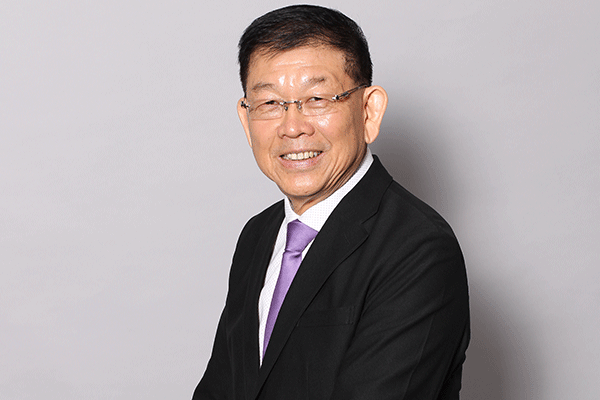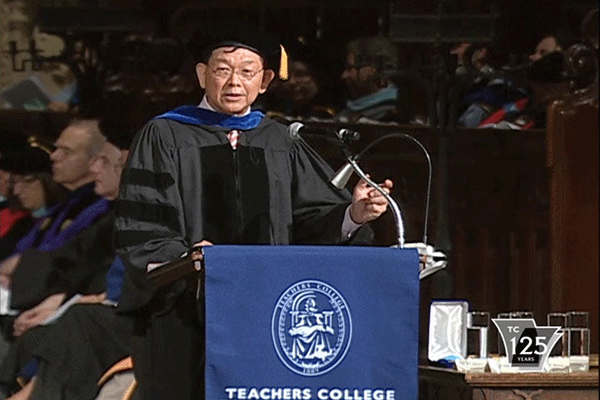Lee Sing Kong, Singapore education leader and TC partner, passes away at 65

Lee Sing Kong, former Director of Singapore’s National Institute of Education (NIE), a leading figure in the nation’s rise to global preeminence in academic achievement, and a long-time partner to Teachers College, died unexpectedly on May 19th.
“Singapore and the world have lost a brilliant education pioneer who truly understood what it takes to build a national culture of excellence, even as he set great store by the need for international partnership,” said Teachers College President Susan Fuhrman.
"Singapore and the world have lost a brilliant education pioneer who truly understood what it takes to build a national culture of excellence, even as he set great store by the need for international partnership."
—Susan Fuhrman
TC Vice Dean A. Lin Goodwin, who worked closely with Lee on the creation in 2012 of a Master’s degree program in Leadership and Education Change jointly run by Teachers College and NIE, called him “a really good and caring friend, a generous and kind person, a passionate and imaginative leader, a man of ideals, vision, and fierce dedication to NIE and Singapore.
“He leaves a very big hole that will remind us always of how much he did for so many, how much he accomplished, and how he always dreamed big – and then made big dreams come true,” Goodwin said.
With Lee at the helm of NIE from 2006 through 2014, Singapore began its ongoing run at the top of global assessments such as the Programme for International Student Assessment (PISA) in mathematics, science and reading.
“Among the nations of the world today, Singapore is virtually synonymous with educational effectiveness, thanks primarily to the role that Singapore’s National Institute of Education has played under your leadership in creating a superb and highly respected teaching workforce,” Professor Emerita Celia Genishi told Lee in presenting him with TC’s Distinguished Service Medal at the College’s Convocation in 2013.

Lee was particularly known for his development of Singapore’s teaching workforce, which Genishi hailed for its “unparalleled pedagogical skills and discipline-specific knowledge.” The nation’s teachers enjoy “a work-life balance that enables them, in your words, to ‘concentrate on the core business of educating and mentoring children,’” Genishi said. She also praised Lee for strengthening “the partnership between the NIE and Singapore’s schools in order to engage senior teachers in mentoring students and, more broadly, to connect the theories imparted in teacher training to the realities of classroom practice.”
The joint TC-NIE Master’s degree program focuses on both instructional and curriculum leadership. The collaboration’s goal has been to establish a new generation of educational leaders for Singapore, the Asia-Pacific region and the larger international community.
After stepping down from NIE, Lee was appointed vice president for education strategies at Nanyang Technological University (NTU). Over the years, as an educator, Lee had developed NTU’s innovations in curricula, teaching methods and assessment. He became the institution’s Vice President of Alumni and Advancement in August 2015.
Lee also established NTU's Centre for Research and Development in Learning (CRADLE), which moved NTU into research for higher education learning.
For his many contributions to Singapore's education system, Lee received Singapore’s prestigious Public Administration Medal (Gold) in 2011.
"He leaves a very big hole that will remind us always of how much he did for so many, how much he accomplished, and how he always dreamed big – and then made big dreams come true."
— A. Lin Goodwin
Lee was also a noted horticulturalist who played a key role in what became known as “the greening of Singapore.” Earlier in his career, he conducted award-winning research on aeroponics – the growing of plants in an air or mist environment without soil – which facilitated the widespread application of that method to commercial agriculture in the lowland tropics. His research also has been adapted for growing plants that can be harvested for the production of new medicines.
“He was trained in horticulturalism and it underlined all aspects of his whole life,” said Leo Tan, a marine biologist who was Lee’s predecessor at NIE. “He had created sustainable agriculture, despite the lack of land and water. So no matter what he was asked to do, he always had an unconventional way of thinking, he always encouraged teachers not to think of limitations, but opportunities.”
Published Tuesday, May 30, 2017